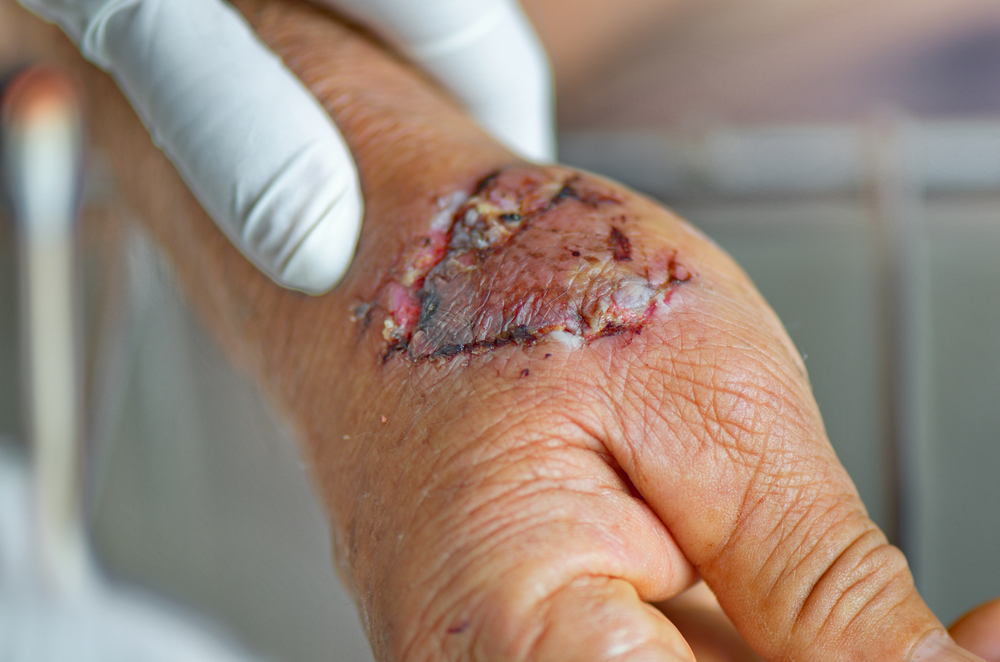Dog Bite Lawyer in Philadelphia
More than 4.5 million people are bitten by dogs in the U.S. each year, and more than 800,000 of those individuals receive medical attention for those injuries, according to the U.S. Centers for Disease Control (CDC). Children are the most common victims of dog bites – at least half of victims are children – and they are more likely to be severely injured.
If you or your child was bitten by a dog, it is important to understand your rights and how to seek the compensation you need for resulting medical treatment, lost wages, and other damages you’ve suffered. Dog bite injuries can lead to substantial costs for victims, not to mention the emotional trauma that ensues. While legal action will not change what happened, your state has laws that will allow you to financially recover if a dog has bitten you or your child. At Gay Chacker & Ginsburg, our experienced dog bite attorneys help people pursue these claims and maximize their recovery. Call the dog attack lawyers of Gay Chacker & Ginsburg at (215) 567-7955 if you would like us to review your case for free. Depending on which state your dog bite occurred, your ability to recover compensation may vary. We have the experience and qualifications needed to protect dog bite victims in Pennsylvania, New Jersey, and surrounding states.
Common Types of Dog Bites
A study of emergency department visits found that dog bites to these parts of the body are most common:
- Face
- Hand
- Upper or lower extremity
- Buttocks
- Genitals
The study’s researchers noted that bite injuries on the hand often lead to infections and the need to return to the hospital for further treatment.

Dog Bite Injuries: Physical, Emotional, and Psychological
A dog attack can cause a variety of injuries, including:
- Physical wounds that have broken the skin, such as lacerations, punctures, and damaged muscle tissue, tendons, ligaments, and more, which can lead to infections
- Bone injuries including bruised and broken bones
Victims with a physical wound from a dog bite should seek medical help right away. The injury may require stitches, surgery, and a course of action by a medical professional to prevent dangerous infections. A physician may provide a tetanus shot and prescribe prescription painkillers and/or an antibiotic. Unfortunately, even with appropriate treatment, a dog bite injury can be permanently disfiguring. Some victims need plastic surgery to make additional repairs after the wound heals.
Infections are a common consequence of a dog bite, and they can even be life-threatening. Contrary to popular belief that dog’s mouths are very clean, they are actually full of bacteria. As a result, a dog bite can cause life-threatening infections including MRSA and tetanus. In addition, unvaccinated dogs can also carry rabies, which they can pass on to people and other animals through a bite.
Dog bite injuries can impact the way the victim thinks, feels, and interacts with other people, according to the University of Pittsburgh Medical Center. After a dog attack, a victim may suffer a variety of emotional and psychological effects, including:
- Fear of dogs and other animals
- Nightmares
- Change of appetite
- Difficulty sleeping
- Speech difficulty
- New fears or phobias
- Personality changes
- Angry or sad outbursts
A dog bite victim may suffer from post-traumatic stress disorder, or PTSD, which often requires psychological therapy to treat.
Types of Damages in a Dog Bite Case
Depending on the severity of the injuries they have suffered and the dog’s history, people who sustain injuries due to dog bites and attacks may be able to seek compensation for the real losses or damages that they suffer as a result of their injuries. This includes recompense for past and future medical expenses. Furthermore, dog bite victims may be able to obtain reparations for the wages they lose while they are off of work recovering from their injuries. In the event the dog attack renders them partially or permanently disabled, they may also receive compensation for the income they may lose as a result.
When a person is bitten or attacked by a dog, they often require medical treatment and care. In some cases, they may also need to take time off of work to recover. As a result, dog bite victims may incur undue expenses. Since the dog’s owner may be held liable for the resulting damages, however, it may benefit those who have experienced such situations to seek legal guidance. A dog attack lawyer may help them to understand their rights, as well as their options for seeking financial compensation.
Pennsylvania Dog Bite Laws
Pennsylvania law requires dog owners to keep their pets under control at all times. This means they need to confine their dogs to their yards using fences, and they need to leash their dogs in public. Dog owners are liable for injuries their dogs cause when they are running loose. When a dog has a history of violent or aggressive behavior, its owner is liable for any attacks — even if the dog bites someone in its own home.
In the state of Pennsylvania, a judge may deem a dog dangerous if it has attacked, caused severe injury or killed a person or domestic animal. Such attacks must occur without provocation and cannot take place on the dog owner’s property. As of 2010, PennLive reported that there were 335 dogs on the state’s dangerous dogs list.
Once a dog is deemed dangerous, the dog’s owner must comply with the following requirements in order to keep their animals:
• Register the dog by paying $500 to the state’s Department of Agriculture
• Neuter or spay the dog
• Keep the dog enclosed
• Post a warning sign
• Purchase a $50,000 liability insurance policy or post bond
Pennsylvania law requires dog owners to keep their pets under control at all times. This means they need to confine their dogs to their yards using fences, and they need to leash their dogs in public. Dogs must be securely kept inside people’s homes, or on a collar and chain that prohibits them from leaving the yard. When pet owners are engaged in certain activities, such as lawful hunting or field training, they must maintain reasonable control of their dogs. Failure to do so could be considered negligence on their part.
Dangerous dogs must be leashed and muzzled if they are taken outside. Failure to comply with these requirements could result in criminal and civil liabilities for the dog’s owner. Dog owners are liable for injuries their dogs cause when they are running loose. When a dog has a history of violent or aggressive behavior, its owner is liable for any attacks — even if the dog bites someone in its own home.
Owner Liability for a Dog Bite Injury in PA
A dog owner is strictly liable if the dog injures a person without provocation, even if the dog does not have a history or propensity of attacking people or animals. In other words, the owner is responsible for any injuries the dog causes, even if the dog has never acted aggressively or bitten before and the owner did not know it would act that way.
Pennsylvania Statute of Limitations for Dog Bite Injuries
People who suffer serious injuries as a result of dog bites do not have an infinite amount of time to take legal action. Like other personal injury cases in the state, there is a statute of limitations for dog bite claims. The time limit to file a Pennsylvania personal injury claim (including a dog bite claim) is two years from the date the injury occurred. For minors, that two-year time limit does not begin until the child turns 18.
Frequently Asked Questions
Below are answers to some common questions about filing a claim and seeking compensation for a dog bite injury.
A dog just bit me. What should I do?
The Cleveland Clinic recommends taking these steps after suffering a dog bite:
- Wash the injury with mild soap and run warm tap water over the wound for five to 10 minutes. Use a clean cloth to slow the bleeding.
- Apply over-the-counter antibiotic cream, wrap the wound in a sterile bandage, and seek professional medical attention.
- After receiving medical treatment, watch for signs of infection, including swelling, redness, fever, and increased pain.
Of course, if the bite is severe, call 9-1-1 right away. After you have received emergency medical treatment and reported the dog bite to the local authorities, it’s helpful to speak to an experienced attorney about filing an injury claim.
My bite isn’t that bad. Do I really need to go to the hospital?
At first, the injury you’ve suffered from a dog bite may seem like something you can patch up at home. However, seeking medical attention and reporting a dog bite are important steps, regardless of whether it seems like the bite is relatively “minor.” Dog bites can cause dangerous infections including MRSA and tetanus. In addition, unvaccinated dogs can carry rabies, which would put you at serious risk of getting very sick. If it does have rabies, the dog could bite and infect other people. A physician can help you ensure you are taking the necessary precautions to prevent serious infections and illnesses that could potentially result from the bite injury. Furthermore, the medical records from your doctor’s visit can help prove your case, should you decide to file a dog bite lawsuit.
Do I have to have been bitten to recover financially from an incident involving a dog?
Not necessarily. A person can still be injured after being knocked down, scratched, jumped on, or otherwise harmed by a dog.
Who is liable for my injuries?
In Pennsylvania, the owner of a dog that bites a person is liable for the victim’s resulting damages – regardless of whether the dog previously acted viciously, or the owner knew that the dog could be vicious. The law is similar in New Jersey; the only exception to this law is when the bite victim was unlawfully trespassing on the dog owner’s property with the intent to commit a crime when the dog attacked.
What would filing a dog bite lawsuit accomplish?
Filing a lawsuit can seek compensation for the medical bills resulting from the dog bite injury. In addition, it’s a powerful tool to send a message that dog owners must do their due diligence to protect people from being bitten. Winning a lawsuit holds the owner accountable for their actions and can help stop a similar attack from happening in the future.
What type of compensation can I recover for my bite injury?
You may have the right to receive compensation for the following damages:
- Medical expenses, including ER visits, hospitalization, diagnostic tests, prescription medication, surgery, therapies, rehabilitation, and other resulting medical bills
- Other monetary expenses related to your injury
- Lost income (past, current, and future) from missing work the incident and any related disability you may have sustained as a result of the bite
- Pain and suffering
- Loss of quality of life and relationships because of the injury
Of course, each case is different. There is no way to tell for sure that you will receive compensation for all the damages above. The best thing to do is to speak with an experienced dog bite attorney right away. He or she will begin investigating your case to determine who is responsible and how much compensation you should receive through your claim.
I have medical bills, but I don’t want to sue the dog owner. What can I do?
Many people hesitate to file dog bite claims because they feel as if they are suing the dog owner, who is often a neighbor or friend. You aren’t going after the dog owner. More likely, you’re going after the dog owner’s insurance company. We all carry insurance for a reason, and people should be able to rightfully access it when injured.
There are some exceptions, however. Many insurance companies refuse to cover certain breeds, such as Rottweilers or pit bulls. Additionally, some companies will only cover the first time a dog bites someone and will refuse any subsequent claims involving the same animal. It is also important to check your policy to find out if it only covers bites on the property. Some policies will not cover bites that happen on the street or in a vehicle, for example.
Can Gay Chacker & Ginsburg help me?
Our attorneys represent people in Pennsylvania, New Jersey, and the surrounding areas. However, if a dog attacked you elsewhere, we may still be able to help. Feel free to contact us for a free, no-obligation consultation.
What happens to a dangerous dog in Pennsylvania?
The following people can file a complaint to charge a person with harboring a dangerous dog:
- Anyone who has been attacked by a dog,
- Anyone on behalf of a person who has been attacked by a dog,
- A person whose domestic animal was killed or injured without provocation
- The state dog warden or a police officer
The owner or keeper of the dog will be guilty of harboring a dangerous dog if the judge finds beyond a reasonable doubt that the dog:
- Severely hurt a person without provocation on public or private property,
- Killed or inflicted severe injury on a domestic animal, dog, or cat without provocation while off the owner’s property,
- Attacked a person without provocation, or
- Been used in the commission of a crime.
- Has a history of attacking people or domestic animals without provocation, and/or has a propensity to attack without provocation
This rule does not apply to dogs used by law enforcement for police work or certified aid dogs.
A person charged with harboring a dangerous dog must keep the dog confined in a proper enclosure or muzzled and on a leash when off the property to see a vet until a report or appeal is complete. It is illegal to dispense, give away move or transfer, or sell or offer to sell a convicted dangerous dog except to have it humanely euthanized or to move it to an approved kennel.
Does a dog that bites or attacks have to be contained in Pennsylvania?
A dog that bites or attacks a person must be confined according to PA law. The dog may be detained and isolated in an approved kennel or at the dog owner’s property or at another location approved by the investigating officer. All detained dogs must be isolated for a minimum of ten days. The investigating officer must notify the bite victim of the medical results of the offending dog’s confinement (to determine whether it is exhibiting any signs of rabies infection).
When a dog that bites or attacks a person is a service dog or a police work dog in the performance of duties, the dog does not need to be confined if it is under the active supervision of a licensed veterinarian.
The owner or keeper of the dog that attacked or bit a person must pay any costs to the victim for resulting medical treatment.
Getting the Legal Assistance to Succeed with Your Dog Attack Claim
Gay Chacker & Ginsburg’s dog attack attorneys have decades of experience in protecting the rights of people who were harmed when a dog attacked them. They know how to face down arguments by the defense and prove that the victim deserves compensation. If you or your child was bitten by a dog, please seek medical attention immediately. Then, our experienced dog bite lawyers will explain your options. We can work to recover your losses, including medical bills, future treatment or therapy you might need, lost wages, and pain and suffering. Call (215) 567-7955 or fill out our online form, and one of our attorneys will review your case for free and without obligation. Contact us to learn more about how we can help you resolve your dog bite case. There is no risk or obligation. We charge victims no legal fees until we recover compensation for them.








